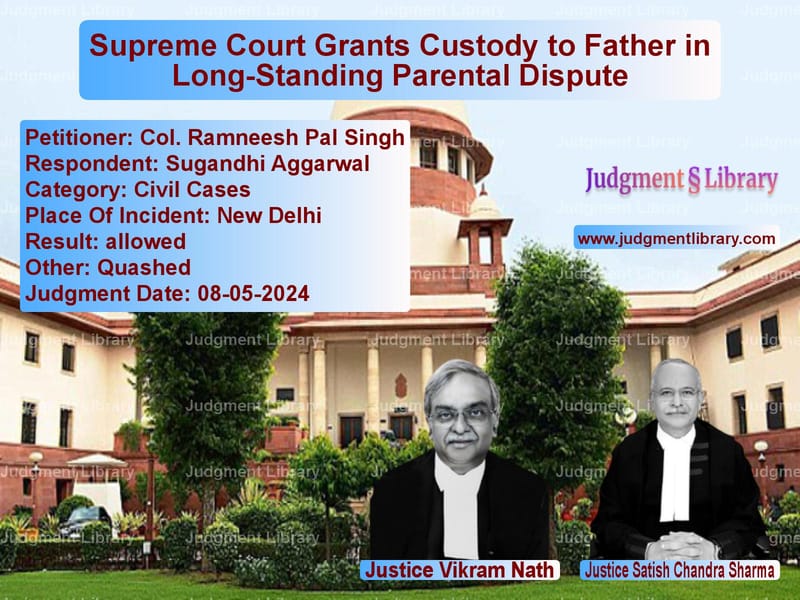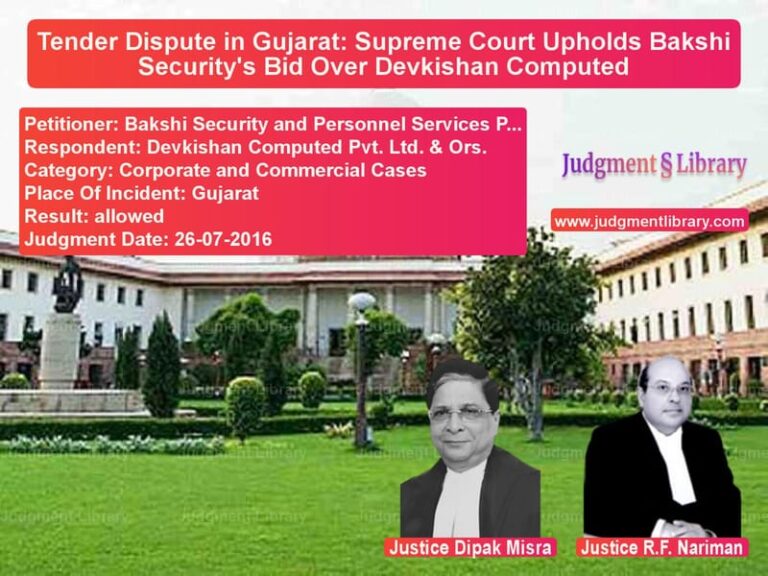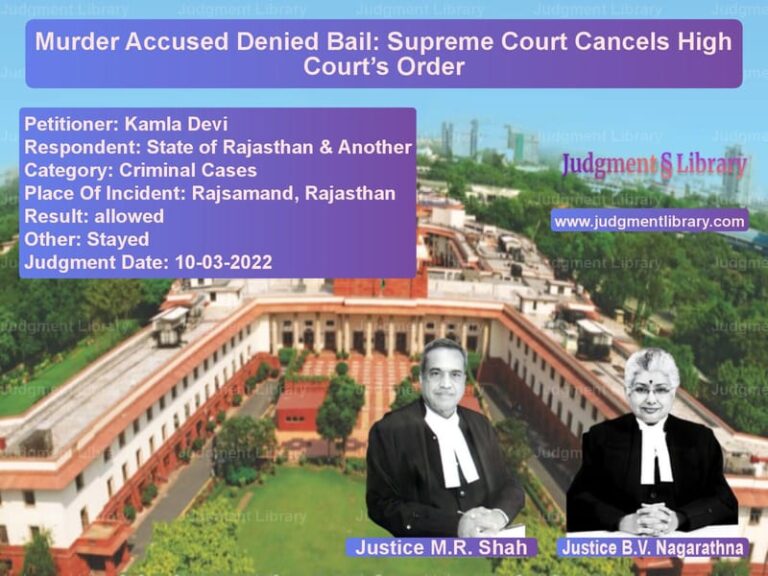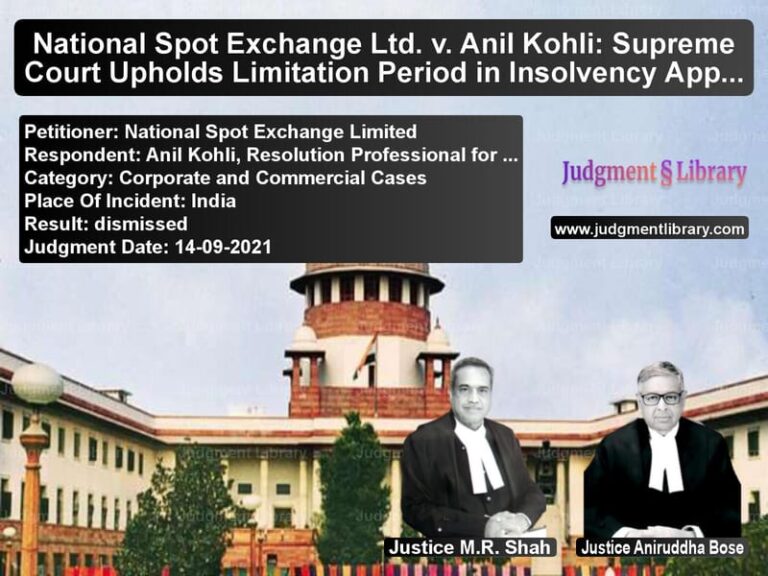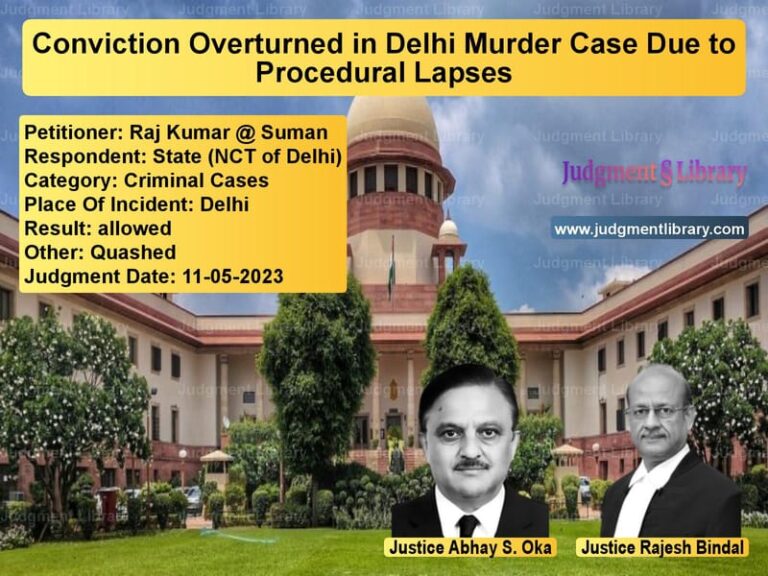Supreme Court Grants Custody to Father in Long-Standing Parental Dispute
The case of Col. Ramneesh Pal Singh vs. Sugandhi Aggarwal is a significant ruling by the Supreme Court concerning a long-standing parental custody battle. The judgment, delivered on May 8, 2024, upheld the decision to grant permanent custody of two minor children to their father, while ensuring visitation rights for the mother. The ruling emphasizes the principle that the ‘welfare of the child’ is paramount in custody disputes.
Background of the Case
The legal dispute arose between Col. Ramneesh Pal Singh, a serving officer in the Indian Armed Forces, and Sugandhi Aggarwal, a school teacher. The couple married on December 22, 2002, and had two children: a daughter (15 years old) and a son (12 years old).
Key events leading to the dispute:
- In 2013, the appellant was promoted to Colonel and posted in Jammu & Kashmir. The respondent continued to reside in Delhi with the children.
- On August 8, 2015, after a marital dispute, the respondent left the matrimonial home for one night. Upon returning, she found the residence locked and the appellant along with the children missing.
- On August 17, 2015, the respondent filed a complaint under the Domestic Violence Act and later a custody petition under the Guardian and Wards Act, 1890.
- The appellant, in response, filed a similar custody petition in Bikaner, Rajasthan.
- The Supreme Court transferred both cases to the Family Court in Delhi.
Legal Proceedings
1. Family Court’s Decision
On August 22, 2020, the Family Court ruled in favor of the father, granting him permanent custody of the children, while allowing the mother the following visitation rights:
- Daily 30-minute audio-video calls with the children.
- Physical visitation on the 2nd and 4th Sunday of every month from 10 AM to 5 PM.
- Temporary custody for 10 days during summer vacations and 5 days during winter vacations.
2. High Court’s Reversal
The respondent appealed to the Delhi High Court, which overturned the Family Court’s decision and granted shared custody of the children. The High Court observed that parental alienation could not be ruled out and ordered that the children be placed under a shared custody arrangement, alternating between both parents every month.
3. Supreme Court Appeal
Col. Ramneesh Pal Singh appealed the High Court’s order, arguing that the children had been living with him for nine years and expressed a clear preference to remain in his custody.
Arguments by the Petitioner (Father)
The petitioner argued:
- The children had been in his custody since 2015 and were well-settled with him.
- They expressed a clear preference to remain with him in multiple court interactions.
- The High Court’s shared custody order disrupted their stable lives.
- As a serving Army officer, he could provide security, education, and a structured environment.
- The allegations of parental alienation were baseless.
Arguments by the Respondent (Mother)
The respondent argued:
- The appellant had wrongfully retained custody of the children.
- The Family Court’s ruling was influenced by allegations of adultery.
- The children needed their mother’s presence for emotional well-being.
- The case involved Parental Alienation Syndrome (PAS), as the children had been isolated from their mother.
- As a school teacher, she could provide a stable and nurturing environment.
Supreme Court’s Observations
1. Welfare of the Child is Paramount
The Court reiterated that child custody matters must prioritize the welfare of the child over parental rights:
“The welfare of the child is of paramount importance and must be determined based on the child’s best interests.”
2. Preference of the Children
The Court interacted with the children and found that both expressed a clear and consistent desire to stay with their father:
“The minor children categorically stated that they were happy and wished to reside with their father.”
3. No Evidence of Parental Alienation
The Court found that there was no credible evidence supporting claims of parental alienation:
“The High Court proceeded on an unsubstantiated assumption of parental alienation without identifying any instances of alienating behavior.”
4. Army Life Provides Stability
The Court recognized that the Armed Forces offer a structured environment beneficial for child development:
“The Indian Armed Forces provide a robust support system including residential accommodation, quality education, healthcare, and extracurricular activities.”
Key Findings and Judgment
The Supreme Court ruled:
- The High Court’s order for shared custody was set aside.
- The father would retain permanent custody of the children.
- The mother would have visitation rights as per the Family Court’s 2020 order.
- Parental Alienation Syndrome was not established.
The Court ordered:
“The appeal is allowed. The High Court’s order is set aside. The custody of the minor children shall remain with the appellant, subject to the visitation rights of the respondent.”
Implications of the Judgment
- Child’s Preference is Crucial: The ruling emphasizes that a child’s clear preference must be considered in custody cases.
- Parental Alienation Requires Proof: Courts must have concrete evidence before accepting allegations of parental alienation.
- Judicial Review of Custody Orders: The Supreme Court reasserts that Family Court decisions must be respected unless there is a compelling reason to overturn them.
- Support for Armed Forces Personnel: The judgment acknowledges the stability provided by military life.
Conclusion
The Supreme Court’s decision in Col. Ramneesh Pal Singh vs. Sugandhi Aggarwal sets a precedent for child custody disputes, reaffirming that the welfare of the child is the most critical factor. By granting permanent custody to the father and ensuring visitation rights for the mother, the ruling provides clarity on the role of parental preference and stability in custody decisions.
Petitioner Name: Col. Ramneesh Pal Singh.Respondent Name: Sugandhi Aggarwal.Judgment By: Justice Vikram Nath, Justice Satish Chandra Sharma.Place Of Incident: New Delhi.Judgment Date: 08-05-2024.
Don’t miss out on the full details! Download the complete judgment in PDF format below and gain valuable insights instantly!
Download Judgment: col.-ramneesh-pal-si-vs-sugandhi-aggarwal-supreme-court-of-india-judgment-dated-08-05-2024.pdf
Directly Download Judgment: Directly download this Judgment
See all petitions in Child Custody
See all petitions in Alimony and Maintenance
See all petitions in Domestic Violence
See all petitions in Judgment by Vikram Nath
See all petitions in Judgment by Satish Chandra Sharma
See all petitions in allowed
See all petitions in Quashed
See all petitions in supreme court of India judgments May 2024
See all petitions in 2024 judgments
See all posts in Civil Cases Category
See all allowed petitions in Civil Cases Category
See all Dismissed petitions in Civil Cases Category
See all partially allowed petitions in Civil Cases Category

